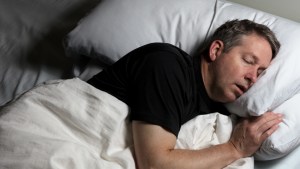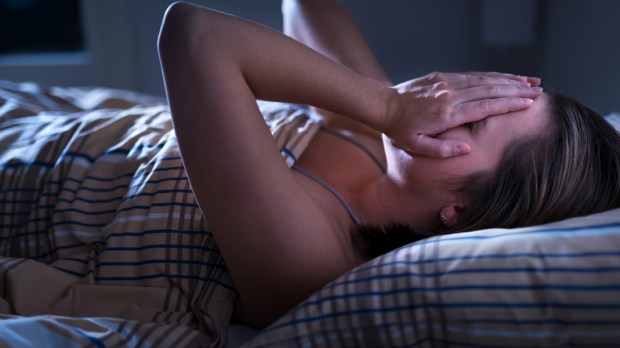- Many people in the world suffer from sleep disorders. It can help to consult with a professional to acquire better habits and work through any setbacks.On the occasion of the World Sleep Day, sleep specialist Olivier Follin gives us a few tips on how to get better quality rest.
Are the hours of sleep as important as the quality of sleep?
Olivier Follin: What counts is not so much how long we sleep as the feeling we have when we open our eyes in the morning: Do you feel rested? There are some rare individuals for whom six or five hours of sleep are enough. But the vast majority of us need seven to nine.
Electricity has revolutionized the way our life is paced. Some 200 years ago, people lived with candlelight or oil lamps. The majority of people didn’t stay up long after sundown: midnight was actually the middle of the night. Today, most evening television programs don’t start until 8 o’clock. Most people usually turn in at 11 p.m. But the quality of our sleep is more important than the hours we get.
What are the consequences of insufficient sleep?
Not getting enough sleep occasionally is not a problem, on the contrary it makes falling asleep easier the next day. It’s not because we didn’t get enough sleep on one night that our whole week is compromised. The problem resides in a repetitive pattern of sleeplessness. This sleep deficit has a direct impact on our mood and relationships: irritation, nervousness, difficulty to focus. It also influences our ability to reason. If you hold a desk job, you won’t be very efficient. But, if you happen to work as a bus driver or an air traffic controller, this lack of concentration and sleepiness could have fatal consequences.
In what conditions can a nap be restorative?
After a meal, the digestive process makes the blood rush to intestines, instead of our brains, which explains why we may feel sleepy. So, early afternoon is an ideal time for taking a nap. But you must be careful: a restorative nap doesn’t exceed 15 minutes. If you complete the sleep cycle of 60 to 90 minutes, you’ll feel “groggy” on waking up, but your efficiency will double after a restorative nap. If you can’t take a nap in the middle of the day, take a few minutes to close your eyes and relax your body.
Does the sleep cycle evolve with age?
After the age of 40, you don’t sleep as deeply as before, so it’s less restorative. Adult women tend to suffer more from sleep disorders than men. This may be attributed to the menstrual cycle and hormonal changes. At menopause, some women wake up in the dead of night because of the hot flashes. Among those over 75, 40% complain about sleep. Insomnia can become more frequent but the treatment and prescription of ever more powerful sleeping pills may not be a good idea in this situation.
What about teens?
With young people, the problem mostly occurs because of the rhythm discrepancy between the school week and the weekends. Having partied all Friday or Saturday night, they sleep late into the afternoon the next day. Then, when it’s time to go to bed, they are not at all sleepy, which explains the fatigue on Monday morning.
Can a healthy lifestyle influence how we sleep?
One of the keys to sleeping better is getting lots of physical exercise during the day. Our sedentary lifestyle means we spend nearly the whole day in a sitting position: behind a desk, in public transport, or in a car. But the more physical energy we use, the more we need to restore it so we sleep better.
Thirty minutes of physical activity on daily basis is recommended.There must be a distinction between daytime when we’re physically and intellectually active, and nighttime when we slow down before heading to bed.
Physical exercise also helps us to get rid of stress and is one of the best antidepressants. It’s responsible for the secretion of endorphins, the well-being hormones, and serotonin which keeps us in a good mood.
In your book I don’t sleep well ! The first aid guide to quality sleep, you also highlight the importance of exposure to daylight. Why is that?
Sunlight has a major impact on our biological clock. In stimulating the hypothalamus, it sends a wakeup signal, darkness sends the opposite message. In wintertime, we suffer from light deficit, which impacts the synchronization between our biological clock and our pace of life. When light therapies may prove costly, we must all try to get as much exposure to daylight as possible: for example, by talking a stroll outside on lunch break for those who work. And inside, choose a spot next to the source of natural light. Why not enlarge one window or even open patio door?
Don’t hesitate to install a CFL bulb or a tube that diffuses a cooler light that is closer to daylight. It reenergizes without tiring the eyes, contrary to blinking neon lights that are hard to support in long term.
What is the right way to relax at the end of a day?
Once you get home, I suggest you put on comfortable clothes and a pair of slippers. Some people don’t even take time to do this. But symbolically this means: “I’ve set my work aside and I’ll get back to it tomorrow.” The majority of insomniacs can’t de-compartmentalize this way: they are with their files and documents, even at night.
What should our evenings be like?
The later we dine, the later we’ll fall asleep. The ideal consists in having our meal at least two-three hours before going to bed.There is a French proverb that rings true: breakfast fit for a king, lunch fit for a prince, dinner fit for a pauper. To speed up digestion, the last meal of the day should be light, without rich sauces and very little alcohol (one glass of wine). Alcohol caninduce sleep, but it also dehydrates so we wake up because of how thirsty we feel.
You should also avoid all sort of screens (television, computer, etc) right before going to bed. The brain can be over stimulated by the flux of images.
The repetitive nature of a ritual develops into habit.Each of us can accommodate it based on what we like. The goal is to slow down, especially in the last half an hour before going to bed.It can be a lukewarm shower (never a hot one, which will raise the body temperature, when we need to lower it). Contrary to what most people think, it’s better to reserve hot water for the mornings. It may be a 20-minute bath (preferably before the meal) with aromatic salts, oils or candles, anything that can help us to relax.
You may also go around the house turning off the lights, locking doors and kissing your kids goodnight: it’s a way to make you feel safer. You also may choose a book — ideally not a stimulating one so you can close it without regret before dozing off. Meditation is even more effective in bringing the sense of calm, harmony, and internal peace.
What can we do to calm ourselves down?
Most people mentally go through their day: “I forgot to send this mail, we need to buy this or that, did I tell him this or that?” But there is one key condition for falling asleep: to empty your head, like a balloon with all its air out. In extreme cases some people get so worked up that it’s impossible for them to fall asleep: “Will I be able to get some sleep? Will I be in good shape tomorrow? I’ve got an important meeting in the morning” … If this becomes a recurrent pattern, they get trapped in a vicious circle.
There exist multiple relaxation techniques: a sheet of paper on your night stand to establish a “to-do list,” a list of things that preoccupy you. You can also count to empty your mind, or focus on specific body parts that you feel growing heavier one after another: legs, arms, head, etc.
But what if this is not enough?
In the evenings, many introverts who tend to bottle up their feelings, switch into an auditory mode. Throughout their workday, they don’t have time to listen to the little voice that constantly talks to them. But at night, they are literally submerged by fears, regrets, criticism and doubts. To break with this habit, one must go into a visual mode.
I use mental imagery to relax. All you have to do is to picture something in your head.For some people, this exercise may prove very difficult. I advise them to imagine something peaceful or neutral, like a landscape: a forest, a river, a desert, a mountain. Initially, the image appears and disappears. As you try to make it reappear, these flashes gradually turn into short sequences and then into longer ones.When the image stabilized, you’ve succeeded. As with paintings, the longer you look at it, the more details there are. Once “caught up” in this image, you let go of tensions and worries. And once you learn how to “navigate” inside it, you can throw the sleeping pills away, because you are already dreaming.
You also highlight the importance of breathing. Can you suggest an easy exercise for everyone?
On a whole, we don’t breathe right: we breathe in too hard and don’t breathe out completely. This is the so-called “clavicular” breathing: the air doesn’t go all the way down, remaining on our shoulder level. Our lungs are not properly oxygenated. Deep breath can fill the whole rib cage. Better oxygenation allows us to relax instantly.
To do this breathing exercise right, you must lie down and place your hands on the stomach. It’s the stomach that must inflate first, then your lungs. Try this exercise in four stages: breathe in slowly, hold your breath – you can hold it up to 20 seconds: the more you practice the easier it becomes – then breathe out and wait for at least 2 seconds before taking another breath.
Practicing this kind of breathing exercise will allow you to empty your mind of all thoughts. When focused on breathing and the effects it procures, you will feel relaxed, then yawn and … fall asleep!
Interview by Stéphanie Combe

Read more:
Sleep in peace with this beautiful night prayer

